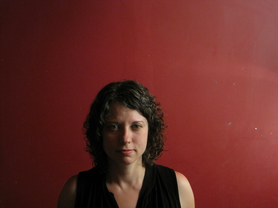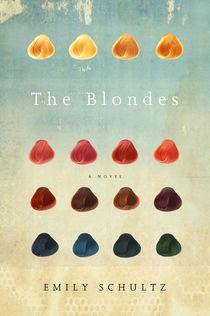RUSTY TALK WITH EMILY SCHULTZ Emily Schultz Emily SchultzPhoto by Brian Joseph Davis Emily Schultz's first book, Black Coffee Night, was a finalist for the Danuta Gleed Award, while her second, Joyland, received rave reviews. Her most recent novel, Heaven is Small, was a finalist for the 2010 Trillium Award alongside Margaret Atwood, Alice Munro, Ian Brown, and Anne Michaels. Her writing has appeared in The Globe and Mail, Eye Weekly, The Walrus Magazine, and several anthologies. Schultz also edits an influential website called "Joyland," which publishes short fiction and commentary from across North America. For this work, she was named one of Canada's digital innovators by Quill & Quire magazine. Schultz lives in Toronto and New York. Kathryn Mockler: What is your first memory of writing creatively? Emily Schultz: When I was in second grade I penned two “books” with hand-drawn covers. I took them in to my schoolteacher and demanded that she read them aloud to the class. One was called The Adventures of Molly Mouse, the other Hemp the Horse. I’m not sure where I’d heard that word, but I thought it made a good name. I guess you could say I started off as a DIY author. KM: Why did you become a writer? ES: I really didn’t feel I had a choice. For example, see above. KM: What influences your writing the most? ES: It varies from book to book. With The Blondes, I guess the contemporary media-scape: the noise of news, disaster, and TV shows like She Survived That … Pregnant?! KM: Could you describe your writing process? (Do you write every day? When? Where? How do you approach revision.) ES: With this book, I wrote the first draft fast, consciously changing my process, which is normally slow and meticulous, weighing every line. My husband and I holed up in a desert cabin for several weeks without internet and that is where I did the bulk of the first draft, writing every day from 9 ‘til 4 while staring out the window at the mountains and desert scrub bush. Strangely, writing quickly I had less structural questions to attack in later drafts, and the characters—although they still needed work—were more consistent. There wasn’t time for self-doubt. KM: Rejection or criticism can often stop new writers before they start. Do you have any advice on how to deal with rejection? ES: Everyone gets rejected. As you become more successful you’re only going to face more or bigger rejections, so you have to get used to it and learn not to obsess. Have a cry, have a drink, watch something stupid on YouTube, and then fuhgeddaboudit. KM: What writers would you recommended to an aspiring writer? Or what writers were influential to you when you first started out? ES: I think you have to find your own writers. I remember when I was young people would tell me, “Oh you simply must read … It will change your life!” and I never seemed to relate to any of those books. I wondered what was wrong with me. And so, although I found writers I related to later, when I was first starting out I tended to write in reaction to work I didn’t care for. I knew more what I didn’t want to be than what I did—but knowing that part actually helped me immensely. KM: What is the best literary advice you've been given that you actually use? ES: Every story must have a beginning, middle, and end—from Aristotle, and my sixth grade teacher. KM: Your funniest or favourite moment that you've experienced as a writer or in the literary world. ES: It doesn’t get any more Canadian than this story. I was in Halifax at a Broken Social Scene concert when a young woman approached me in the crowd. She asked if I was Emily Schultz. She’d read my book and recognized me from a newspaper photo. This was about ten years ago, and it was the one and only time anyone ever recognized me at a non-literary event. I felt like a star. KM: Can you tell us about your new book The Blondes? ES: If this were a Hollywood pitch meeting, my one line would be: Blondes, with rabies. But this isn’t a Hollywood pitch meeting, so I’ll see if I can give a bit more of an impression. Plot-wise, it’s about a grad student who finds out she is pregnant from an on-and-off-again relationship with her married thesis advisor. She’s exploring all these feelings of being bewilderment, not knowing how she feels about him, about her own actions, or if she should keep or terminate the pregnancy, when an epidemic (a virus affecting only blonde women) forces her actions and her fate. I wanted to explore how women both threaten and relate to one another, and at the same time work again in the satirical form. I also wanted the book to be an action-adventure novel for women. KM: What are you working on now? ES: My next novel is still too early to talk about. But I’m doing some screenwriting with my husband Brian Joseph Davis. It’s a TV show about life at an alternative weekly.  EMILY SCHULTZ'S MOST RECENT NOVEL The Blondes, Random House, 2012 Description from the publisher A breakout novel for a young writer whose last book was shortlisted for the Trillium Prize alongside Anne Michaels and Margaret Atwood, and whom the Toronto Star called a "force of nature." Hazel Hayes is a grad student living in New York City. As the novel opens, she learns she is pregnant (from an affair with her married professor) at an apocalyptically bad time: random but deadly attacks on passers-by, all by blonde women, are terrorizing New Yorkers. Soon it becomes clear that the attacks are symptoms of a strange illness that is transforming blondes--whether CEOs, flight attendants, skateboarders or accountants--into rabid killers. Hazel, vulnerable because of her pregnancy, decides to flee the city--but finds that the epidemic has spread and that the world outside New York is even stranger than she imagined. She sets out on a trip across a paralyzed America to find the one woman--perhaps blonde, perhaps not--who might be able to help her. Emily Schultz's beautifully realized novel is a mix of satire, thriller, and serious literary work. With echoes of Blindness and The Handmaid's Tale amplified by a biting satiric wit, The Blondes is at once an examination of the complex relationships between women, and a merciless but giddily enjoyable portrait of what happens in a world where beauty is--literally--deadly. Kathryn Mockler is the publisher of The Rusty Toque.
Comments are closed.
|
Rusty Talk
Rusty Talk Editor: Archives
November 2017
Categories
All
|

 RSS Feed
RSS Feed
